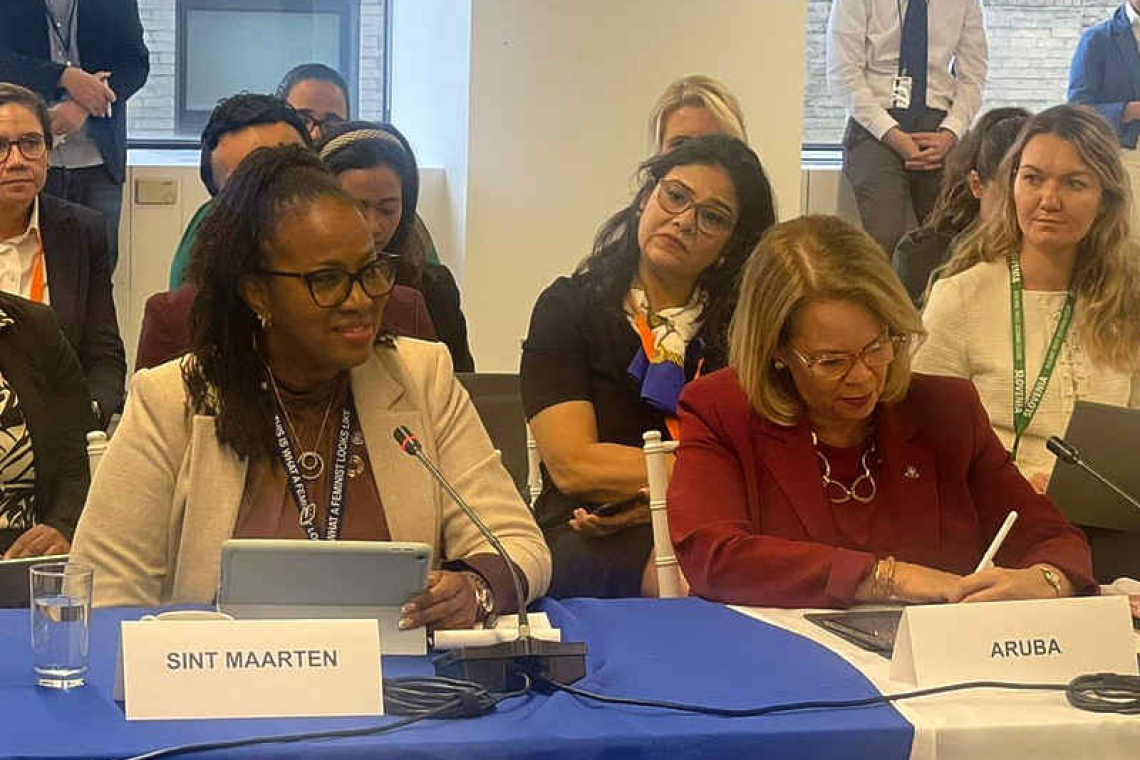Prime Minister Silveria Jacobs (left) and Prime Minister Evelyn Wever-Croes (right).
PHILIPSBURG--Prime Minister and Minister of General Affairs Silveria Jacobs, representing the Kingdom of the Netherlands, attended a high-level side event recently on the importance of early warning systems.
The event was hosted by the Independent State of Samoa’s Permanent Mission to the United Nations as a discussion on how to mitigate the impact of climate change-related disasters.
The gathering emphasised the significance of early warnings in saving lives and livelihoods in the face of extreme weather events and climate change. It was noted that early warning systems can significantly reduce damage, with an investment of US $800 million in developing countries potentially averting losses of US $3-16 billion annually. Countries with substantial early warning coverage experience lower disaster mortality rates compared to those with limited coverage.
However, it was highlighted that only half of the countries worldwide report having the capacity to alert their citizens about impending hazardous weather conditions, it was stated in a press release. Small island developing states (SIDS) are faced with limited coverage, with only one-third reporting the existence of multi-hazard early warnings.
Opening remarks at the event were delivered by notable figures in the field of climate change and disaster risk reduction, including Schuster, Minister of Natural Resources and Environment of Samoa; Professor Petteri Taalas, Secretary-General of the World Meteorological Organization; Mami Mizutori, Special Representative of the Secretary-General for Disaster Risk Reduction; and Jagan Chapagain, Secretary-General of the International Federation of Red Cross Red Crescent.
High-level delegates included Prime Minister Evelyn Wever-Croes of Aruba; Jacobs; Minister Khadeeja Naseem of the Republic of Maldives; Under-Secretary Pasi Hellmann of Finland; and Macia Wong, Deputy Assistant to the Administrator of USAID.
Discussions covered topics such as innovative finance, systematic observations financing, and the role of non-state actors in empowering communities to respond effectively to early warnings.
“St. Maarten faces severe vulnerabilities due to climate change and natural disasters, which have taken a toll on both its communities and economy. The island currently lacks a comprehensive early warning system, making it ill-prepared for impending threats. To address this critical issue, the government of St. Maarten has partnered with the European Union through the RESEMBID programme to develop a comprehensive early warning system, focusing on capacity building and improved warning dissemination.
“Cross-border collaboration with French St. Martin is also crucial for a robust system. However, the establishment of such systems requires substantial resources that are often beyond the reach of SIDS,” said Jacobs during her address at the event. “This is where the United Nations can play a pivotal role by providing the necessary financial and technological support, empowering vulnerable nations like St. Maarten to build resilient and life-saving systems.
“Achieving these early warning systems is not only about disaster prevention but also about safeguarding lives, livelihoods, ecosystems, and contributing to global climate action in line with the sustainable development goals. With UN assistance, St. Maarten envisions a safer, more resilient future for its communities and environment.”







